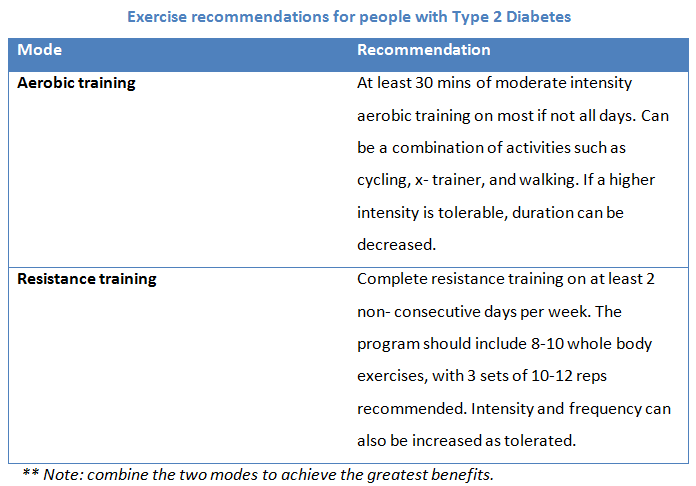Resistance exercise is a therapeutic tool that helps the patient with chronic disease to enhance their muscle strength and manage to provide them quality life. It is the proven fact that Resistance training exercises helps to increase the bone minerals and manage the blood glucose as well. For that purpose, doctors now recommend aerobic exercises and resistance training for the diabetic patients. Type 2 diabetes occurs when your body’s cells resist the normal effect of insulin, which is to drive glucose in the blood into the inside of the cells. This condition is called insulin resistance. As a result, glucose starts to build up in the blood. There are rumours regarding the exercises where people interpret that resistance training might create complications for the patients but these are totally wrong. The more they perform such exercises, the more they would be able to enhance their lifestyle. It would be appropriate to perform resistance training with the help of professionals specially those who are suffering from type II diabetes1. They could go to gym; go for walk and even swim that not only increase their muscle strength but reduce the fats.

In diabetes, patient’s complaints that they are experiencing muscle twitching and weakness. Moreover, patients complain regarding fatigues and frequent low energy. In that case they should consider their stamina and of course muscle strengthen would help to build such stamina. Therefore, medical professionals prescribed walking for diabetic patients, mostly morning walk and walk after the meal helps to maintain blood sugar level. Not only this, but morning walk freshen up the mind that ultimately creates a pleasant affect to the body. The more patients feel comfortable and fresh they could enhance their muscle strength2. Other than this, for the older age patients, Squats to chair, Side Lying circles, and side planks are the best resistance training exercises that would be suitable for all the ages.
Resistance training has recently been recognized as a useful tool for treating several chronic diseases, including Type 2 Diabetes, which has been found safe and profound for both elderly and obese individuals. It helps to increase Insulin sensitivity, daily expenditure of energy, and improving the quality of life. Different studies showed the benefits of resistance training for Diabetes type 2, which overweight other methods used to treat diabetes type 2, which includes that three months of moderate resistance training causes a reduction in AA1C from 8.8% to 8.2%which leads to the improvement of lean body mass. Similarly, it is found that five months of progressive resistance training helps to lower down LDL cholesterol and fasting triglycerides.It also reduces plasma insulin response to glucose ingestion, which improves self-monitored blood glucose measurement.
Resistance training helps increase muscle strength, lean body mass, and mineral density of bone, enhancing the functional status and glycemic control and assisting in the prevention of osteoporosis and sarcopenia. Training helps improve bone density and lowers the risk of osteoporosis, and strengthens the joints, helping to maintain mobility as aging. It is found that the glucose disposal rate measured by hyperinsulinemic-euglycemic clamp increased by 48% with high volume (5 times a week) moderate-intensity resistance training performed for 4-5 weeks. In resistance training, there is an increase in skeletal muscle mass related to decreasing in A1C, which demonstrates that resistance training improves glycemic control by augmentation of skeletal muscles’ glucose storage.3
A study demonstrates that one-legged resistance training enhanced the insulin action of skeletal muscle in type 2 diabetes individuals independent of increased muscle mass. The protein content of Glutamine 4, insulin receptor, glycogen synthase, and protein kinase B- Alpha and Beta, along with total glycogen synthase activity, were enhanced. These findings demonstrate improvement in the regulation of insulin-mediated Glutamine 4 translocation and in the insulin signaling pathway, which explains the improved insulin sensitivity with resistance training. Resistance training further helps to improve insulin sensitivity by reducing the visceral adiposity. It is reported that there is a reduction in visceral and subcutaneous fat by 10.3% and 11.2%, and on the other hand, insulin sensitivity increases by 46.3%. Resistance training does not eliminate the need for insulin by the body. Still, it helps the body metabolize glucose for energy production without the need for extra insulin either produced by the pancreas or injection by an external source. While performing resistance training, the muscle fibers are tearing apart. To get stronger, those muscle fibers have to be rebuilt. This requires more energy, further burning more calories and glucose, thus decreasing the body’s need for insulin.4
Resistance training helps to achieve efficient and lean muscles; it helps build more muscle in fat, which is incredibly efficient as muscle has greater consumption of glucose than fats. So greater the use of muscles, the more efficiently the body can control blood glucose level. This makes resistance training excellent strategy for weight loss and maintenance. It is recommended that resistance training be an essential component of well-balanced physical activity program for those type 2 diabetes individuals who do not have a contraindication to exercise. It should be performed at least two days a week with a minimum of 9-10 exercises involving major muscle groups for 12-15 repetitions near fatigue.1
In conclusion, Resistance training should be consider with the help of experienced physiotherapists so they could provide proper repetitions. Most importantly, it should be planned according to the patient’s age and severity. Patients should follow resistance training for at least 30 minutes.
Peachy Essay and its solid medical science writing help team consist of several medical doctors provides a wide range of academic writing services including:
– Medical science assignment help
– Medical science essay help
– Medical science dissertation help






